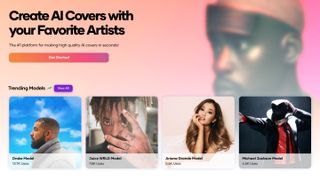Purge all you want, Spotify, it won't cancel AI music – and Grimes has a better idea
You'd be better off taking a leaf out of her book…

It's an awkward dichotomy. Spotify knows full well the benefits of AI – the big green streaming giant currently has an AI DJ built with the help of ChatGPT's creators in beta and plans on using 'what if' style counterfactuals to suggest your next playlist – but AI-generated music? No, no. That it cannot abide.
In fact, at the beginning of the month, Spotify removed "tens of thousands" of songs from AI-powered music creation app Boomy, in a bid to confront the rise of AI-generated songs.
That's right: one of the best music streaming services going (and definitely the biggest) tried to cancel AI-generated music by simply purging it. Far be it from me to tell Spotify what to do, but it won't work.
Why? Because AI is here to stay, folks. Whatever your thoughts on intellectual property – and believe me, as a performer I have plenty of thoughts on it – the simple truth is that people like AI; they like Kanye West singing Tracy Chapman's Fast Car (available on YouTube, I will not link to it here). And even some of Drake's biggest fans think an AI model of his vocal, featuring an AI model of The Weeknd, added to a song written and produced by TikTok user ghostwriter977, Heart On My Sleeve, is better than anything the artist has released in some time.
Oh, and Boomy says it's already back in business on Spotify (thank you, Music Business Worldwide) and that tracks actually started landing back on the streaming platform less than a week after disappearing.
No, Spotify, cancel-culture is not the way.
Voicify is all wrong – I tried it and I'm ashamed to say I liked it

Don't knock it until you've tried it, right? So off I go, taking my first, tentative steps into AI-made music. For the princely sum of $8.99, I get 25 Voicify credits, which means 25 goes at selecting one of its 37 models (read: AI vocals) and pairing it with a YouTube URL of any song I like.
Get daily insight, inspiration and deals in your inbox
Get the hottest deals available in your inbox plus news, reviews, opinion, analysis and more from the TechRadar team.
Voicify is an AI music generating platform whereby curators (or pilferers, depending on your angle) buy tokens to create tracks – MJ singing Prodigy or Paolo Nutini? Give it a go. Within seconds, I have made two tracks: 'Drake' singing Joshua Kadison's Jessie and AI Juice WRLD's rendition of Adele's Never Mind. And I'm ashamed to say that for the duration of the tracks, I loved them. I giggled with utter glee and delight upon hearing AI Drake muse about phone booths in Vegas at 5am.
But none of these artists – not Adele, not Joshua Kadison, Drake or Juice WRLD – made a fraction of a cent from my dalliances. By using what Voicify casually calls its Voice Experience Platform, I have pilfered hit songs, plagiarised vocals and toyed mercilessly with brands for my own amusement. And, if I were to join a referral program to get others to sign up, I might even get a commission. Surely it's not right, is it?
And Tony Rigg, lecturer in music industry management at University of Central Lancashire (UCLan) and music industry advisor, seems to agree. "The use of AI in the music industry is a double-edged sword, with tensions arising from its potential to undermine the value of human creativity juxtaposed with its potential to augment it" he said of the Spotify case, adding "AI is demonstrating its potential to undermine talent. A huge amount of effort and investment has gone into developing Drake and The Weeknd and building their value, and arguably what is happening here could be described plagiarism of their brands… This is potentially problematic to both the industry, and also to the artists. It is very easy to see why artists might not be happy."
Of course, the most worrisome aspect of all of this is the undermining of moral rights and intellectual property. Sites such as Voicify allow anyone to mimic artists' styles and sounds. The rub, I imagine, is that there is no copyright in ideas. But there is another way…
Make like Grimes: adapt to your ever-changing environment (and charge 50%)
I'll split 50% royalties on any successful AI generated song that uses my voice. Same deal as I would with any artist i collab with. Feel free to use my voice without penalty. I have no label and no legal bindings. pic.twitter.com/KIY60B5uqtApril 24, 2023
We can try to block, cancel and nix it all we want, AI versions of us are coming, and Elon Musk's on/off partner has adopted a far more Darwinian approach.
As if reeling off the paraphrased quote: "It is not the most intellectual or strongest of the species that survives, but the one that is able best to adapt and adjust to the changing environment in which it finds itself" Grimes took to Twitter on April 30 to tell fans about her new AI-powered software, Elf.Tech, that generates her voice.
Quipping, "Feel free to take advantage of Grimes IP!", Grimes' had previously responded to the viral AI track of Drake and The Weeknd (above), on April 24, saying "I'll split 50 percent royalties on any successful AI-generated song that uses my voice. Same deal as I would with any artist I collab with. Feel free to use my voice without penalty. I have no label and no legal bindings."
A seed had clearly been planted, because Elf.Tech. was born on April 30.
Grimes is getting ahead of the game; it means she'll be able to lock in royalties for AI-generated content that will take her zero effort or time to produce. And that is something all of us could and should learn from, including Spotify.

Becky is a senior staff writer at TechRadar (which she has been assured refers to expertise rather than age) focusing on all things audio. Before joining the team, she spent three years at What Hi-Fi? testing and reviewing everything from wallet-friendly wireless earbuds to huge high-end sound systems. Prior to gaining her MA in Journalism in 2018, Becky freelanced as an arts critic alongside a 22-year career as a professional dancer and aerialist – any love of dance starts with a love of music. Becky has previously contributed to Stuff, FourFourTwo and The Stage. When not writing, she can still be found throwing shapes in a dance studio, these days with varying degrees of success.
Most Popular




